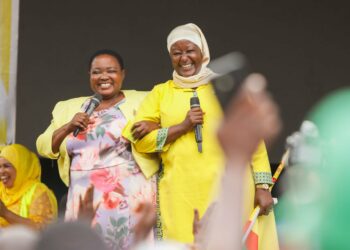Farmers cannot be asked to produce beyond what they can only rudimentary grow and as the soils continue to get degraded we continue to face issues of food security as crop yields and quality reduce. Remember, 77% of households in Rubirizi depend on subsistence farming as a main source of livelihood.
Rubirizi like any of the other parts of Uganda we are facing seasonal changes due to climate change and we continue to witness conditions that threaten food production. Remember, we would say that the District relies most on the two sectors of Agriculture and Tourism which will not thrive with the level depletion of natural resource.
Natural resource is a critical determinant of food supply. Degradation of natural resources such as soils, forests, fisheries, water, undermines production capacity, while availability of and access to agricultural inputs such as water, fertilizer, pesticides, energy, research, and technology determine productivity and thereby production.
World Food Programme (WFP) estimates that 16.4 million Uganda face insufficient food consumption and show that chronic malnutrition levels have grown to 28.5% of children under the age of 5 years. And it is also believed that about 45% of Uganda’s food produced doesn’t meet the quality standards for export.
The people of Rubirizi face increasing challenge to meet basic needs and most basic which is food security. This community immiseration will lead to the loss of the depletion of the natural resources (cutting down of trees, encroaching on wetlands and contaminating natural water).
Therefore, if not checked through a well planned process, the integration of environmental degradation, poverty and population growth in the Rural Rubirizi poses an exceptionally dangerous problem and leading to increasing food prices and creating an unhealthy reliance on imported products.
The problem of little access to land and other capital resources has made labor to become the most alternative to sustain livelihood and this has led to increasing numbers of labor externalisation even amongst the old people and married couples.
And any form of community positive transformation depends critically on a process of mindset change. Where we must shift our thinking from a consumption-based mindset to a conservation-based one which implies valuing the earth’s natural resources and recognizing that they are finite.
We must be able to think differently about our problems by creating solutions around societal and human wellbeing. This involves understanding the needs of people, knowing what is important to them, learning about our own communities and developing a bond with stakeholders in the community.
But as we continue to to limit ourselves from going beyond the primitive rules and shallow borders of the rural society we will need to collectively advocate for a conception of liberal education to sharpen our mindset and therefore raising an intellectual community of critical thinkers who are able to question common beliefs, knowing how to debunk them and turn away from extremist processes of local politicians.
There needs to be strategic steps towards sustainable development and must include integrating environmental issues, the population and social welfare concerns into decision making and development planning.
Local initiatives and institutions should be transfered from the central government and hierarchical churches to the local town councils and municipalities.
We also need to improve the financial situation of town councils and municipalities by increasing the share of taxes.
Putting that household is the key to the development of a community because the family is the first social institution that forms the systems of beliefs and values, our development efforts and initiatives should start from the families to help them restore, improve and maintain their income.
The writer is Beinomugisha Fredrick. A local opinionist and writer with Rubirizi Edition Magazine. 0781871270 / 0751068770. beinfredrick@gmail.com.
Do you have a story in your community or an opinion to share with us: Email us at editorial@watchdoguganda.com













